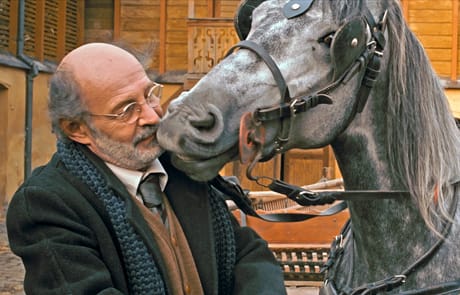Filmed almost entirely with static camerawork and an exceedingly straightforward shot composition, Cabaret Balkan director Goran Pasklajevic's examination of the Semlin Judenlager concentration camp in Belgrade, When Day Breaks, is nothing if not dignified and respectful of its subject matter. Each moment is handled with severity and every scene presented without embellishment, leaving all potential interpretation beyond what is literally presented on screen at the door.
Jumping into the plot without delay, Misha Brankov (Mustafa Nadarevic), a retired music professor, receives advice that the people who raised him were not actually his parents. Left with a non-Jewish family as an infant when his parents were taken to the camp, Misha (whose real last name is Weiss) has only a small metal box discovered in the ground at the Nazi death camp to help him learn about his true heritage.
This journey ultimately defines this very severe, deliberately paced drama, as Misha starts to learn about the Jewish faith, as well as the horrors of the Nazi occupation. Giving him a connection to his long deceased parents, he finds a partially completed music composition from his father that he focuses on completing as a testament to their sacrifice and brevity of their lives.
Since this story holds little subtext and is told without any embellishment, save a yellow filter during flashback dream sequences, where Misha imagines himself in the concentration camp environment, there's little to consider beyond the obviously grave, but familiar, subject matter. And since Paskaljevic has no interest in creating complex characterizations or utilizing the medium to exploit parallels or allegory, we're left only with the driest of exposition to maintain interest.
While the importance of reminding modern audiences about the injustice and monstrosity of the Holocaust is implicit, Paskaljevic could have injected any number of narrative tricks or styles into his film to make it less painful to endure.
Despite respecting what he's communicating, the reality is that When Day Breaks feels like an exercise in cinematic torture, offering absolutely nothing to stimulate the brain beyond blanket stoicism and seriousness.
(Nova Film)Jumping into the plot without delay, Misha Brankov (Mustafa Nadarevic), a retired music professor, receives advice that the people who raised him were not actually his parents. Left with a non-Jewish family as an infant when his parents were taken to the camp, Misha (whose real last name is Weiss) has only a small metal box discovered in the ground at the Nazi death camp to help him learn about his true heritage.
This journey ultimately defines this very severe, deliberately paced drama, as Misha starts to learn about the Jewish faith, as well as the horrors of the Nazi occupation. Giving him a connection to his long deceased parents, he finds a partially completed music composition from his father that he focuses on completing as a testament to their sacrifice and brevity of their lives.
Since this story holds little subtext and is told without any embellishment, save a yellow filter during flashback dream sequences, where Misha imagines himself in the concentration camp environment, there's little to consider beyond the obviously grave, but familiar, subject matter. And since Paskaljevic has no interest in creating complex characterizations or utilizing the medium to exploit parallels or allegory, we're left only with the driest of exposition to maintain interest.
While the importance of reminding modern audiences about the injustice and monstrosity of the Holocaust is implicit, Paskaljevic could have injected any number of narrative tricks or styles into his film to make it less painful to endure.
Despite respecting what he's communicating, the reality is that When Day Breaks feels like an exercise in cinematic torture, offering absolutely nothing to stimulate the brain beyond blanket stoicism and seriousness.
